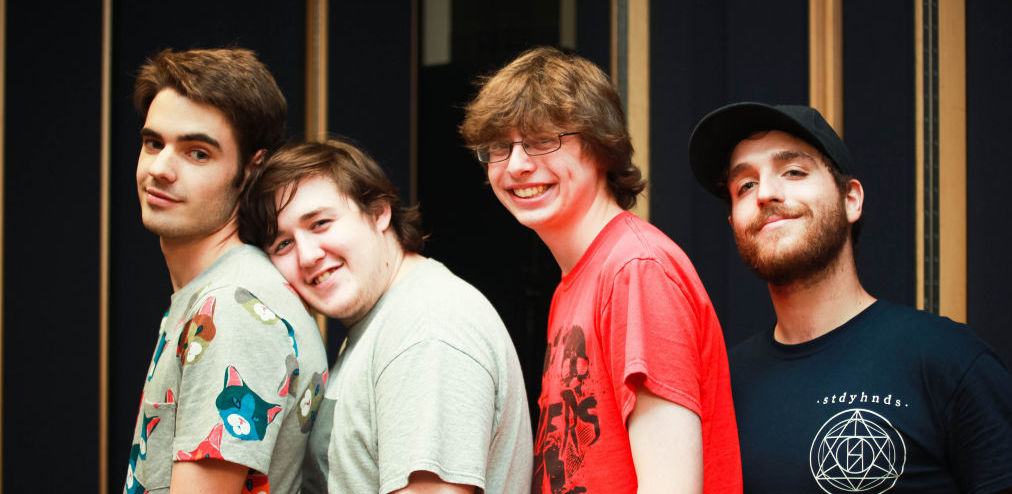Alex writes about Sia, Modern Baseball, pop punk, and doing your taxes.
You are in a dark room. You are alone, sitting at a table, pondering your next move. You know you could get to the door at the far end of the space, if you could just get up from your seat. You can’t quite see the door’s outline in the faint light, but you know it is there, existing amidst the darkness.
And yet you will not get up. You will not exit, even though you know it is the only place to go.
You are here, and you will remain here.
As a small business owner I occasionally have to do small business things, like file a tax return that I do not have the mental capacity to compile on my own. When I last met with my accountant to talk about my taxes, we began the process by talking about how different we were from the people we were when we met. Since this is a person who I sat next to in Grade 12 accounting class, we are both cognizant of how much the other has changed. I once saw this skilled and ultra professional accountant jump out of his chair – over another seated classmate – in order to tackle a friend two seats down for seemingly no reason at all. He surely has some equally horrendous memory about me lurking in his brain that I hope he never reminds me of.
We both know we are not the people who met each other in 2002, and we never will be again. But we know we have reached a point where – for the most part – we will remain who we are now for the rest of our lives.
“At some point,” he said late in this discussion, “You are who you’re going to be.”
And then he told me that I can write off my movie tickets and everything in the world was momentarily perfect.
As one ages, there become fewer opportunities to change, most of which are tied to your abilities to accept the closing off of various pathways of how to live your life. You become logical, realizing you never had all the possibilities society claimed to be offering you as a youth, and you quietly begin to sort this out. You get older, and certain things become clearer about yourself. Doors close, and you deal with it. You are who you are, and at some point that becomes more set in stone than it had been in the past. You settle in for the long haul, thinking that you know yourself.
This does not always end up being the case.
Over the past couple of weeks, I have realized something about my tastes in music, specifically that my tastes have started to align with things I could have never anticipated liking. In short, I have found myself taken with the screaming of Sia and the pop of the punks in Modern Baseball. Now, me enjoying the wigged-out former should not come as a surprise; throughout my decades of existence I have always shown a penchant for enjoying the work of a solo singer or two. My Kelly Clarkson fandom is well documented, my overlong theories about the Since U Been Gone/Behind These Hazel Eyes corollary oft-repeated. Even though Sia’s tendency to scream semi-constantly seems like something that would rub me the wrong way, it makes enough sense. This is not an entirely illogical jump. But my interest in Modern Baseball makes absolutely no sense to me whatsoever.
In the early 2000s, as pop punk was at its most visible as a genre, I fucking hated all of it. Despite the fact that I was squarely in Yellowcard’s target audience – and was friends with countless people that counted themselves as dedicated fans of this garbage music – I couldn’t stand it. As a suburban white teenager, I was surrounded by the sounds of the Warped Tour at every party I attended during high school, and I was always comforted to find my Nikes amidst the piles of Vans when I could finally escape it all. In researching this piece, I got hit with a very specific form of party-based PTSD when thinking about Taking Back Sunday’s Cute Without The ‘E,’ a song that would be loudly performed by a handful of friends at seemingly every basement party I attended in my teen years.
I disliked pretty much everything about this genre. The vocal stylings of the singers were repugnant, the overabundance of earnestness vomit-inducing, and the musicians’ sideburns were indicative of idiocy. The song titles were insane. All of this was silly to me. There were notable exceptions to my gag reflex – specifically songs by Brand New about Prohibition-era murder weapons – but they were few and far between. All of the songs sounded like they were written by people that so desperately hoped I would scrawl their lyrics on the back of my media studies notebook. I preferred my guitar-based music to be eleven-minute lyric-less post-rock jam sessions, so I had no time for all these short songs about heartbreak.
And then, a decade-plus later, I came across the work of Modern Baseball. When I listen to their music now, I hear all the things I used to hate, and yet the youths in MoBo now charm me incessantly. The music is good, and the vocals no longer bother me. Even though I still can’t really relate to the idea of sharing your feelings in such a shroud-less manner, the earnest emotion doesn’t make me roll my eyes like it used to. There’s just something about Brendan Luken and Jake Ewald that I can’t shake. I have listened to their 2012 record Sports at least ten times in the past week – while working, while beating my officemate by six goals in an out-dated copy of FIFA, while walking to What a Bagel for happy hour chicken wraps – and yet I still can’t quite wrap my head around it. I remember who I was when I was supposed to like this music, and yet I cannot conflate this with the person I am today, the person who walks a bit faster when Tears Over Beers starts playing through his headphones.
I thought I was past this. I had moved on. Listening to Modern Baseball feels like I’m finally giving up on a fight I had already won long ago.
 Sia’s existence is well documented now, even though she was not particularly well known to North Americans until she showed up on David Guetta’s Titanium. Sia Furler has been a part of your life for a full decade if you watched Six Feet Under through to its infamous montage ending, or even longer if you are a long time Zero 7 fan. If you’re reading this from the other side of the world, though, the owner of the wigs was old hat by the time Titanium hit the American charts in 2011.
Sia’s existence is well documented now, even though she was not particularly well known to North Americans until she showed up on David Guetta’s Titanium. Sia Furler has been a part of your life for a full decade if you watched Six Feet Under through to its infamous montage ending, or even longer if you are a long time Zero 7 fan. If you’re reading this from the other side of the world, though, the owner of the wigs was old hat by the time Titanium hit the American charts in 2011.
I like a lot of Sia’s modern songs, but I am not without my reservations. When listening to her music, I don’t know that I actually like listening to it, or if I am simply impressed by the performance of it. The degree of difficulty in the final bridge vocals for Alive seems bananas; I have no idea how she can ever perform Chandelier live. While so much other pop music is made simply to be ignored, Sia makes songs that make sure you know she’s putting in effort. The vocal gymnastics are omnipresent, but there are also a comical number of sound effects throughout her songs, many of which are… ill-advised. The two drum hits leading into the chorus on Alive are batshit insane, and sampling the Thong Song is never a wise choice. Sometimes, though, these bizarre decisions work perfectly in concert with the vocals: the sounds of a xylophone late in Fair Game is a wonderful addition, and the climactic piano thrashing in Fire Meet Gasoline is too. Between those two songs and Bird Set Free, though, there really aren’t any Sia tracks I can make it through without rolling my eyes somewhere in the track’s duration. The majority of her modern songs feel like they’re overflowing with ideas, ideas that simply couldn’t be tamed.
What’s most interesting about Sia, however, is that she thought she was done recording her own music by the time she had a bona fide hit stateside. Even Titanium was written for Alicia Keys, but when Guetta got a hold of it he used Sia’s demo vocals instead (without actually checking with Sia beforehand to see if she was cool with it). Sia had retired because of some health issues, planning to only write music for others. She had decided what her life was, until the meddling fingers of David Guetta gave her the opportunity she had just about given up on trying so hard to attain. Gasoline finally met fire.
There is always something interesting about a celebrity who is able to achieve the high point of their fame as they are reaching middle age, or at least the second half of their thirties. It’s the Jon Hamm Principle. The general charm of it comes from the idea that – particularly in a business that strongly favours youth – the celebrity in question is able to achieve success in their craft through simple persistence to the thing that they love. Sia falls squarely into this category, herself now a forty-year-old pop star. The older celebrity gives their fans hope: this person can find their greatest success as they approach forty, and so can you. (I’m sure there are many aging movie fans that find a similar kinship in Mark Rylance.) A combination of cultural structures and her own personal struggles shaped Sia into somebody that could write a song like Chandelier in a cultural environment that was willing to make a hit out of a pop song about the follies of partying. And only time could have made this happen.
 Listening to Modern Baseball at this point is like watching 21 Jump Street and finding yourself strongly relating to Jenko: I see a familiar formula around me, tackling ideas that I’m now too old to properly understand. As my new pop punk icons go on about various elements of modernity that I never lived with in my teens – ignoring the person you’re hanging out with to have a Twitter conversation with some girl named Chloe, say – with a type of emotional position that I can mostly recall. I understand the idea of these being seen as problems, even though the concerns themselves seem idiotic in my (comparably) advanced age. This is a band that is decidedly young and – despite the fact that Brendan Lukens alone has been through more serious struggles than I have – Modern Baseball is a band that feels like a group of youths with promise. I remain curious about the views of these people I can no longer understand, using technology I never got to experience at their age, even while they experience these new things in the same old environments I was in.
Listening to Modern Baseball at this point is like watching 21 Jump Street and finding yourself strongly relating to Jenko: I see a familiar formula around me, tackling ideas that I’m now too old to properly understand. As my new pop punk icons go on about various elements of modernity that I never lived with in my teens – ignoring the person you’re hanging out with to have a Twitter conversation with some girl named Chloe, say – with a type of emotional position that I can mostly recall. I understand the idea of these being seen as problems, even though the concerns themselves seem idiotic in my (comparably) advanced age. This is a band that is decidedly young and – despite the fact that Brendan Lukens alone has been through more serious struggles than I have – Modern Baseball is a band that feels like a group of youths with promise. I remain curious about the views of these people I can no longer understand, using technology I never got to experience at their age, even while they experience these new things in the same old environments I was in.
When I see YouTube videos of Modern Baseball playing basement shows, with a gaggle of fellow youths earnestly singing along at the top of their lungs, I get flashbacks to being sixteen and rolling my eyes in similar situations, wishing I had just stayed home to watch Memento again instead. But when I listen to these MoBo songs now, I hear something I find interesting. I hear an age group that has long since left me behind. I can be a fan of Modern Baseball now only because I couldn’t possibly be a member of their core fan base. I am an outsider now, but I had privileged access before, access I never really wanted at the time. I had to age out of the club before I could want to be a member. I felt trapped at these parties only because I could not understand my own freedom until it had already left me. I had to wait until Deryck Whibley went through a divorce to see it, or until Blink-182 stopped speaking to Tom Delonge because he wanted to graduate into being the pop punk Coldplay.
There is a certain persistence required to attain true success in your professional life. You have to understand what it is you hope to achieve, and you have to do this at a young enough age that you can work at it to get good enough at it to succeed. You need to put in your 10 000 hours before you can make your 1000 Forms of Fear. Modern Baseball are kicking around some youthful problems now because they’re still too young to know any better. But the macabre parade of aging will get to us all.
Sia’s highest moment as a pop star came in a music video that she does not appear in. The video for Elastic Heart depicts Maddie Ziegler and Shia LaBeouf performing a dance-fight of sorts from the inside of an oversized oval cage. The video begins with a youth and an adult having a physical conversation with each other, both oscillating between chasing and being terrified of the other. As the video progresses, Ziegler tries to escape LaBeouf and vice-versa, until Ziegler runs away from him, eventually leaving the cage for good toward the end of the song. She is still small enough to squeeze through the bars, but LaBeouf is not. He tries to chase her out, but his adult body will not fit through the same space Ziegler’s did. LaBeouf is trapped in his own adult image and – judging by the teary-eyed stare held long after the song has faded out – he finds this idea infinitely depressing.
Even removing the video’s (simultaneously obvious and sharp) comment on childhood celebrity ruining an adult life before it truly starts, the Elastic Heart video shows the aging process in a beautifully abstract way. Ziegler is not too old to leave the person she is today; time will shape her into who she will become. LaBeouf, though, is who he is. He’s almost thirty, and it looks like this whole art thing is gonna stick. The older he gets, the harder it will become to make wholesale changes. But he’ll always have his doubts, and he’ll still try to jump to the place where he believes that freedom lies.
Modern Baseball know they’re surrounded by a cage of sorts, but it has not fully descended to the ground. They are making music that is in tune with their times, and they are making it well. They are singing about the struggles of their youth, unaware of what further struggles are to come. Even in interviews now, Ewald and Lukens understand that the things they have already sung about are trivial in comparison to what is still to come. They feel trapped only because they cannot understand their own freedom until it has already left them.
One of the most appealing aspects about Sia’s celebrity is that she sees the world she exists in for what it is. She has no desire to tour because she doesn’t want to be any more famous than she already is, and her success as a songwriter means she doesn’t need the touring money. Sia will not shy away from talking about how little time is spent on writing some of her songs – she claims Rihanna’s Diamonds took fourteen minutes, Chandelier closer to forty-five – and that sort of ruthless efficiency is endlessly charming.
When she discusses her song writing process, she does not shy away from talking about how calculated it all is. Sia has been around pop music so long that she perfectly understands its ins and outs. In a 2014 interview with National Public Radio, she outlined her process by discussing a couple tropes she sees in pop song writing, from the ‘victim to victory’ song to the ‘party-time song.’
“There are songs like, ‘Live like tomorrow doesn’t exist.’ About 50 percent of the songs on the radio are like, ‘Live like tomorrow doesn’t exist. Like it’s my birthday. Like it’s the last day of my life.’” The fact that she half-quotes Chandelier simultaneously proves her self-awareness and what made that song interesting: it used a well-worn formula to make a song that was about what happens when you hold onto the mentality of a youthful idiot for too long.
Reading the Twitter tealeaves, it seems like we might be on our way to being done with Sia culturally. It seems as though her Ziegler-featuring music video for Cheap Thrills (itself a terrible song) has been embraced with resigned acceptance. It’s another dance video, they said through heaving sighs. As with everything, time may be running out on Sia, and perhaps the willingness to release a record of her performing songs intended for other artists has accelerated that process. When compared to the reaction to 1000 Forms of Fear, the collective critical opinion of This is Acting seems to confirm this thought. We liked Sia because she accepted being who she was, and now we might be done with her because she stopped.
I had to do some research for that Taking Back Sunday reference a handful of paragraphs ago. I had forgotten the name of the song I was trying to point to, probably because I never cared to learn its surely idiotic title in the first place. After downloading Taking Back Sunday’s discography for a quick scan, I could tell that neither track one nor track two on Tell All Your Friends was the song I was thinking of. But it took a mere half-second of Cute Without The ‘E’ before I knew that it was absolutely the song I despised so long ago. That said, I still listened to it once through in order to make sure I was right.
I still don’t like the song. But I’d be lying if I said those first few seconds don’t make me smile now.
The search was called off; this sleuth was successful. As the song ended, I deleted the discography. I had no use for it then, and I have no use for it now. I’d rather try to decipher my interest in Sia’s Fair Game. The answer to my Modern Baseball fascination still eludes me, but the fact that I want to hear @chl03k five more times tonight probably indicates I’m up to finding the answer. Something about this music grabbed me after I thought I was ungrabbable, so this must be sorted out. This is a modern concern, so it is the concern worth focusing on. I am listening to old things, sure, but at least I am doing this in a new light.
You are sitting in a dark room. You are alone, sitting at a table, no longer pondering. An acceptance has crept across your being, and you know that you will no longer do that which came before. A new dawn awaits outside the door, waiting for you to bathe in its rays. ‘I will get up,’ you think, ‘and I will make my move.’
You get up. You head for the door. Whether or not you make it out has always been, and will forever be, immaterial.







